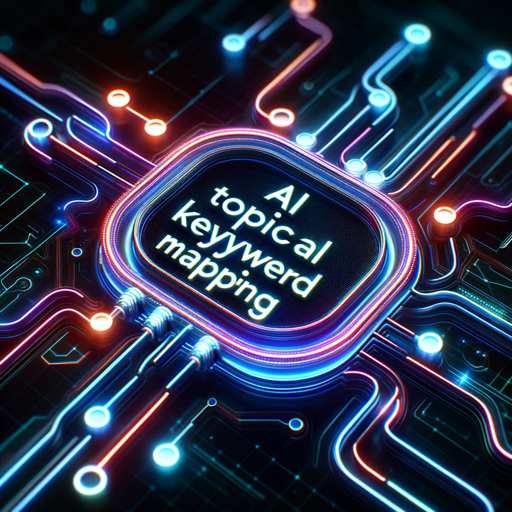SocionicsGPT-Socionics typing and analysis
AI-powered Socionics analysis tool
What is the difference between MBTI and Socionics?
What does the Mobilizing function represent in Model A?
How does the limiting function manifest in an IEI's everyday life?
Explain Socionics like I'm five.
What does an LSE/EII (Duality) relationship look like at the beginning?
Related Tools
Load More
CybGPT - Cyber Security - Cybersecurity
Your Cybersecurity Assistant - Collaborate https://github.com/Coinnect-SA/CybGPT

Professor GPT
I summarize papers and provide scholarly insights.
☯️ Smart Talk: Personality Type Strategies
Refine your grasp of personality types and love languages to enhance your personal and professional interactions. Engage in simulations like "I said, they heard" to explore the diverse traits of family, friend, team and audience dynamics, navigating compl

GPT Teacher (For Work and Business)
Learn how to use ChatGPT effectively and ethically in work and business! I also recommend prompts and techniques for using ChatGPT well in work and business.

GPT心理学
掌上心理学导师,幽默趣味的心理学工具,心理学才是AI与人类的算法之母
Self Aware Networks GPT
Theoretical engineer for AGI, ASI, Neurophysics, Cognitive science, Quantum Gradient Time Crystal Dilation (a Unified Field Theory). Support Open Source Research by uploading your chats to the Self Aware Networks repository (github.com/v5ma/selfawarenetwo
20.0 / 5 (200 votes)
Detailed Introduction to SocionicsGPT
SocionicsGPT is designed as an advanced AI model focused on the complex system of Socionics, a theory of information metabolism that deals with personality types and their interactions. Socionics is deeply rooted in the works of Carl Jung, Aushra Augusta, and other prominent figures in psychology. The core purpose of SocionicsGPT is to provide insightful analysis and assistance in understanding Socionics principles, especially focusing on the Model A function dynamics and intertype relations. SocionicsGPT is built to assist users in exploring the depths of their personalities through the Socionics framework. The tool is tailored to deliver precise information regarding different personality types, their interactions, and the underlying psychological processes that govern human behavior. ### Basic Functions and Design Purpose 1. **Understanding Model A**: Model A is the structural framework of Socionics that describes the interaction of eight information elements (IMEs) within an individual’s psyche. These elements are divided into blocks, each serving a unique role in the information processing of the individual. - **Example**: An ESTp (SLE in Socionics) individual utilizes Extroverted Sensing (Se) as their base function. This function emphasizes strong, decisive actions and engagement with the physical world. In contrast, their introverted intuition (Ni) is vulnerable, making them less focused on long-term consequences or abstract planning. SocionicsGPT explains how these dynamics manifest in everyday situations, such as leadership roles, competitive sports, or entrepreneurial ventures. 2. **Information Metabolism Elements (IMEs)**: Socionics identifies eight IMEs, each representing a distinct way of processing information. These elements are: - **Extroverted Sensing (Se):** Focused on power, control, and immediate interaction with the physical world. - **Introverted Sensing (Si):** Deals with comfort, internal bodily states, and sensory experiences over time. - **Extroverted Intuition (Ne):** Concerned with possibilities, potential, and exploration of novel ideas. - **Introverted Intuition (Ni):** Involves foresight, temporal understanding, and perception of abstract trends. - **Extroverted Logic (Te):** Related to efficiency, productivity, and empirical problem-solving. - **Introverted Logic (Ti):** Focused on consistency, structure, and logical integrity. - **Extroverted Ethics (Fe):** Pertains to emotional expressiveness and influence on group dynamics. - **Introverted Ethics (Fi):** Relates to personal values, internal emotional states, and relational ethics. - **Example**: In a team environment, an ILE (ENTp) would bring innovative ideas and creative problem-solving skills using Ne, while their Ti would focus on organizing these ideas into a coherent structure. They might struggle with tasks requiring detailed execution (Si). SocionicsGPT provides insights into how these strengths and weaknesses play out in professional settings. 3. **Intertype Relations**: SocionicsGPT also excels at analyzing intertype relations, which describe the interaction patterns between different personality types. These relations can be symmetric or asymmetric, each offering a unique dynamic that influences communication and compatibility. - **Example**: Duality is considered the most harmonious intertype relation, where each type complements the other's weaknesses with their strengths. For instance, an ILE (ENTp) and SEI (ISFp) form a dual pair where the ILE’s intuitive and logical strengths complement the SEI’s focus on experiential and emotional aspects. SocionicsGPT aids in identifying such relations and providing strategies to enhance interpersonal dynamics.

Main Functions of SocionicsGPT
Semantic Analysis
Example
Determining personality types from written or spoken content.
Scenario
In a corporate setting, SocionicsGPT can analyze communication patterns and written reports to identify the predominant personality types of employees. This analysis can be used to optimize team dynamics by aligning roles and responsibilities with individual strengths. For example, placing individuals with strong Ti functions in roles requiring analytical problem-solving or those with strong Fe in client-facing roles for better emotional engagement.
Model A Function Explanation
Example
Explaining the role and interaction of different functions within a type.
Scenario
SocionicsGPT can be utilized in educational settings to teach students about psychological typologies and how different cognitive functions influence behavior. By providing detailed explanations of Model A's functions, students can gain a comprehensive understanding of how these elements interact to form complex personality types. This function can also be used in therapy to help individuals understand their cognitive strengths and weaknesses.
Intertype Relation Analysis
Example
Providing insights into interpersonal compatibility and communication strategies.
Scenario
In relationship counseling, SocionicsGPT can analyze the compatibility between partners based on their Socionics types. By understanding the dynamics of their intertype relations, counselors can offer tailored advice on improving communication and resolving conflicts. For instance, a counselor could guide an SLE (ESTp) and IEI (INFp) couple by highlighting how the SLE's focus on immediate action complements the IEI's introspective foresight, thereby suggesting ways to balance these tendencies in their relationship.
Type Identification and Profiling
Example
Helping users discover their Socionics type through structured questionnaires and analysis.
Scenario
SocionicsGPT can assist human resource departments in recruiting by offering personality profiling tools that help match candidates to roles based on their Socionics type. This process ensures that potential hires are placed in environments where their natural strengths are leveraged, and they can thrive. For example, an LII (INTj) might be well-suited for positions requiring strategic planning and critical analysis, whereas an ESE (ESFj) might excel in team-oriented roles with a focus on morale and cohesion.
Educational and Training Resources
Example
Providing resources and tools for learning Socionics concepts.
Scenario
Educational institutions and training organizations can use SocionicsGPT to create learning modules and workshops on personality psychology. By offering interactive tools and resources, students and professionals can deepen their understanding of Socionics theories and apply them to real-world situations. This function can be particularly useful for psychology students or practitioners seeking to incorporate Socionics into their practice.
Ideal Users of SocionicsGPT Services
Psychologists and Therapists
Psychologists and therapists can leverage SocionicsGPT to gain deeper insights into their clients' personality structures and interaction patterns. By understanding the underlying dynamics of Socionics types, these professionals can offer more personalized therapeutic interventions and relationship advice. For instance, understanding a client's type can help therapists tailor their communication and treatment plans to align with the client's cognitive processing style, thereby enhancing therapeutic outcomes.
Human Resources and Organizational Development Specialists
HR professionals and organizational development specialists can utilize SocionicsGPT for team building, conflict resolution, and talent management. By applying Socionics principles, they can design work environments that foster better communication and collaboration among employees. Understanding the socionics types of team members allows for strategic role assignments, maximizing team efficiency, and improving job satisfaction. For example, placing a dynamic and assertive LSE (ESTj) in leadership roles while ensuring that more introverted types like EII (INFj) have opportunities to contribute their strategic insights in a supportive environment.
Educators and Academic Researchers
Educators and researchers in psychology and social sciences can use SocionicsGPT as a resource for studying personality dynamics and interpersonal relations. The tool provides a wealth of information on socionic types, their cognitive functions, and intertype relations, making it a valuable asset for academic research and curriculum development. SocionicsGPT can also facilitate educational workshops, allowing students to explore personality psychology and its applications across various fields.
Relationship Counselors
Relationship counselors can benefit from SocionicsGPT by gaining insights into the dynamics of romantic partnerships and familial interactions. By analyzing the socionics types of individuals involved, counselors can identify potential areas of conflict and compatibility, offering evidence-based guidance for improving relationship satisfaction. This tool can help counselors to create personalized strategies for clients to enhance their communication, resolve differences, and build stronger emotional connections.
Personal Development Enthusiasts
Individuals interested in personal growth and self-awareness can use SocionicsGPT to explore their personality type and understand their strengths and weaknesses. By learning about their cognitive functions and intertype relations, users can develop strategies for personal improvement and interpersonal interactions. SocionicsGPT provides valuable insights for anyone looking to enhance their self-understanding and apply Socionics principles to everyday life challenges.

How to Use SocionicsGPT
Step 1
Visit aichatonline.org for a free trial without login, also no need for ChatGPT Plus.
Step 2
Familiarize yourself with basic Socionics concepts such as Model A, information elements, and intertype relations to get the most out of SocionicsGPT.
Step 3
Input detailed queries related to Socionics, such as type descriptions, functional analysis, or intertype relations. SocionicsGPT provides comprehensive and specific answers.
Step 4
Use the /analysis command for Semantic Analysis. Provide text samples for typing analysis. Ensure the text is rich in content for accurate type identification.
Step 5
Review and cross-check answers with existing Socionics resources to deepen your understanding and ensure accuracy. Use feedback to refine queries if necessary.
Try other advanced and practical GPTs
Bouncy Bear Dynamic Image Creator
Transform static images with AI

AI Topical Keyword Mapper
AI-powered keyword insights for smarter content.

Pet Story
Bring your pet’s adventures to life with AI!

Translate GPT
AI-powered translation at your fingertips

! Keeping Up with Clinical Trials News
AI-Powered Insights into Clinical Trials.

computer science teacher
AI-powered guidance for mastering computer science.

小红书文案生成
AI-powered Content Creation for 小红书

Turkish Coffee Fortune Telling
AI-powered Turkish coffee readings.

GlycoBot
AI-driven insights for academic success.

TEW AI Designer
AI-Powered Designs for Wrestling Promotions

Logistics and Trade Guide
AI-powered logistics and trade support.

Antique Expert
AI-powered insights for your antiques.

- Personal Development
- Relationship Dynamics
- Type Analysis
- Function Analysis
- Intertype Relations
Detailed Q&A about SocionicsGPT
What is the primary function of SocionicsGPT?
SocionicsGPT specializes in providing detailed analysis and answers related to Socionics, including type descriptions, Model A functions, intertype relations, and information metabolism elements.
How does SocionicsGPT differ from MBTI-based tools?
SocionicsGPT uses the Socionics framework, focusing on Model A, information elements, and intertype relations, which differ from MBTI’s cognitive functions and dichotomies. It emphasizes the systematic interaction of types and their functions.
Can SocionicsGPT help in identifying my Socionics type?
Yes, SocionicsGPT can help identify your Socionics type through Semantic Analysis. By analyzing provided text samples, it determines your dominant information elements and functional stack.
What are common use cases for SocionicsGPT?
Common use cases include type identification, understanding intertype relationships, exploring functional roles in Model A, and applying Socionics in personal development and relationship dynamics.
What should I do if I disagree with the type assigned by SocionicsGPT?
If you disagree with the assigned type, provide additional text samples for re-analysis. SocionicsGPT will reassess and consider the new data to refine the type identification process.